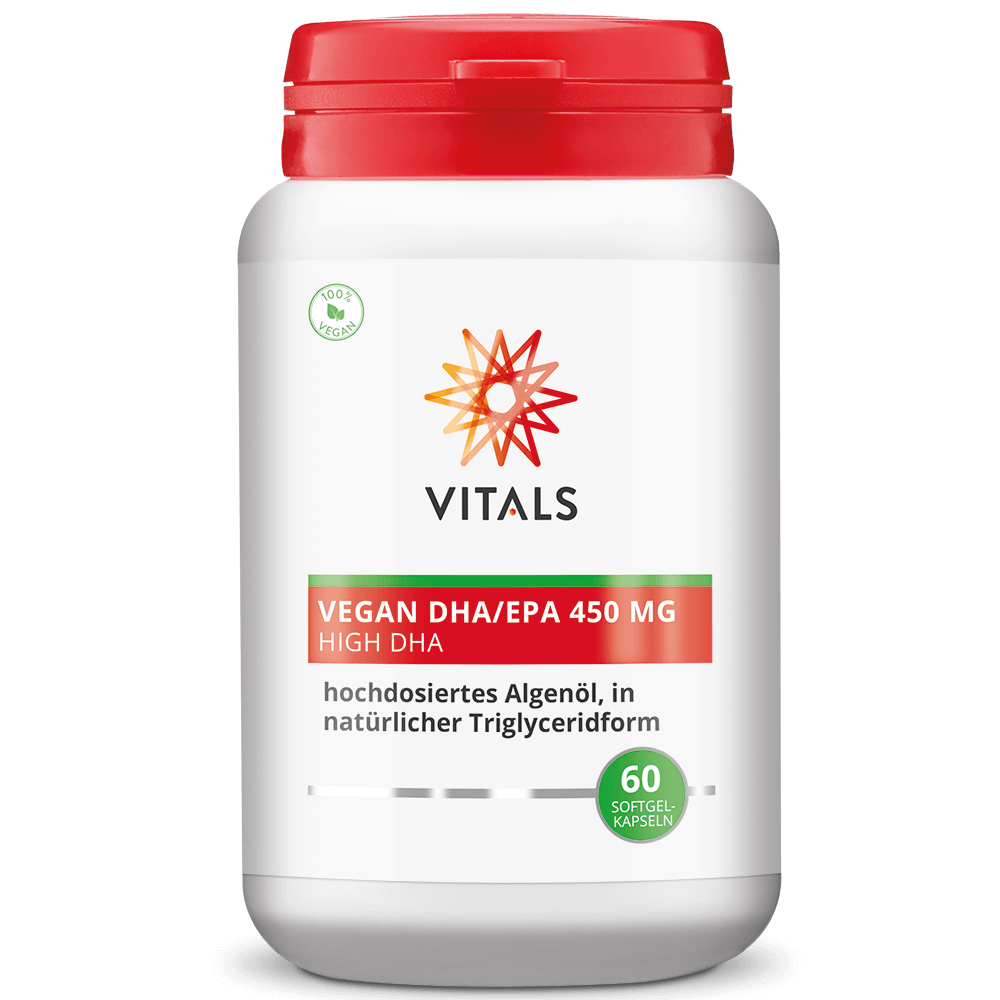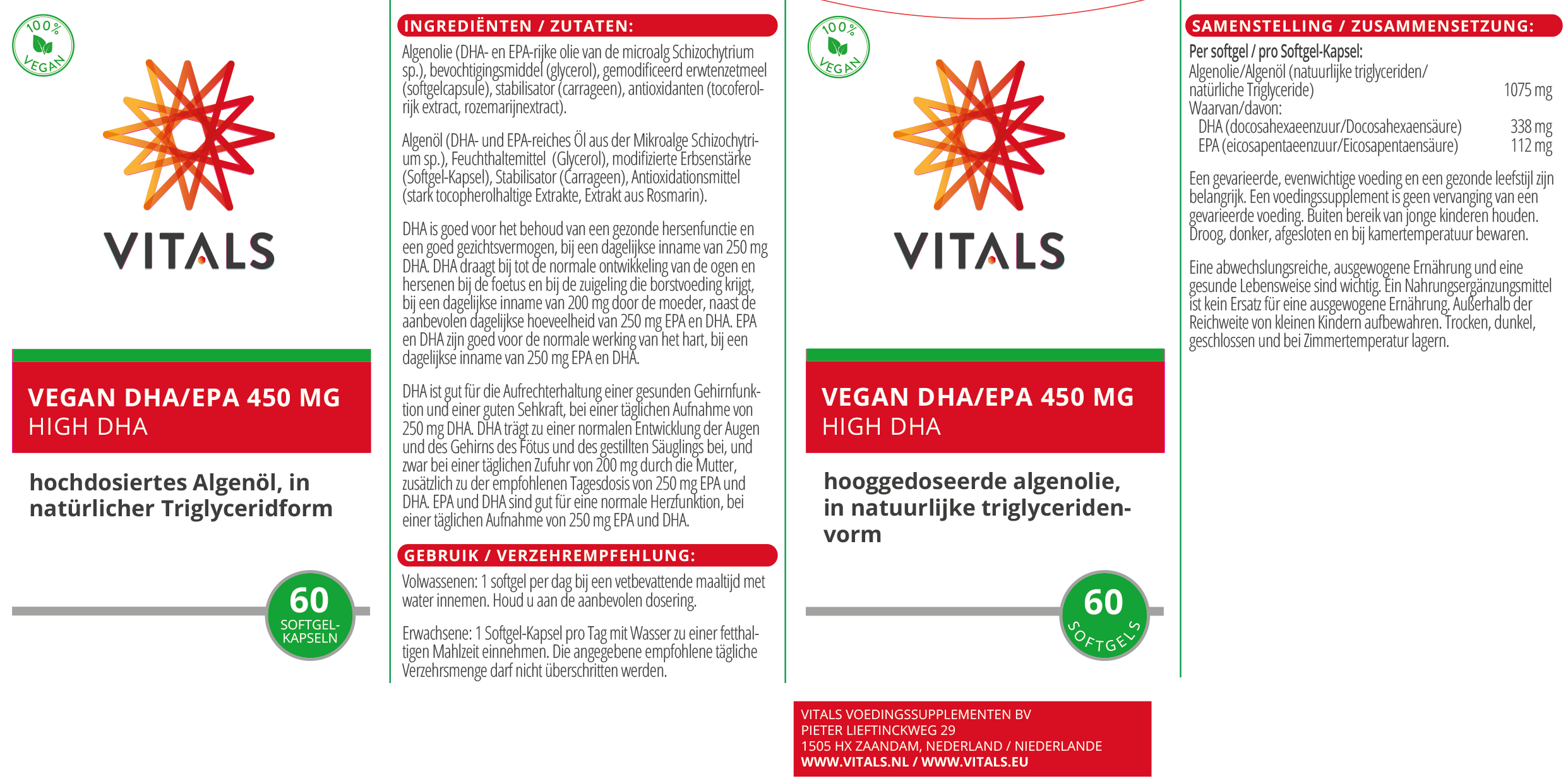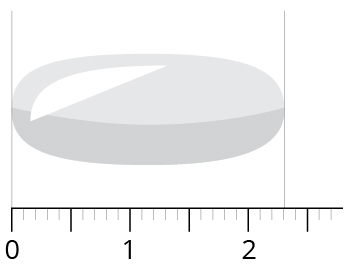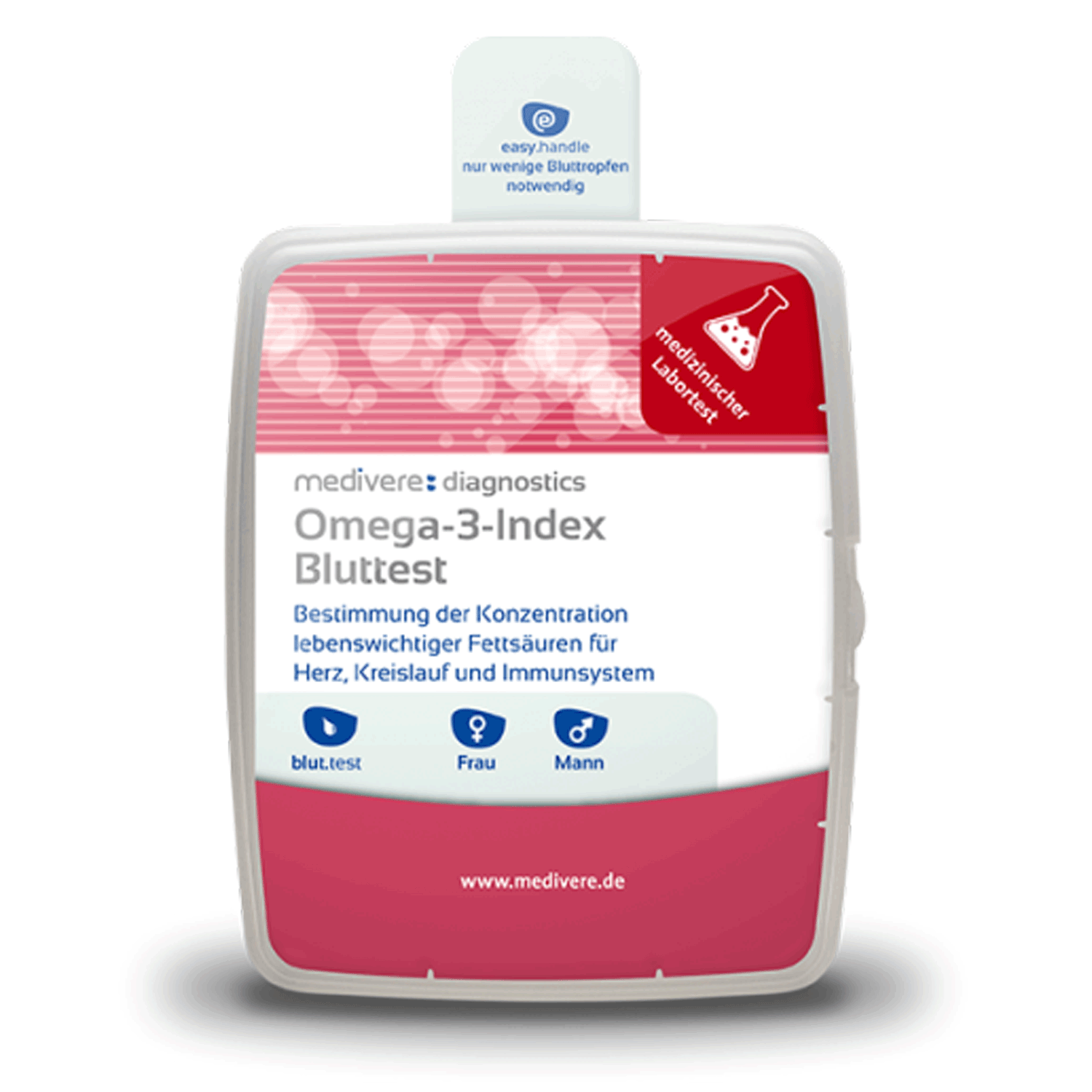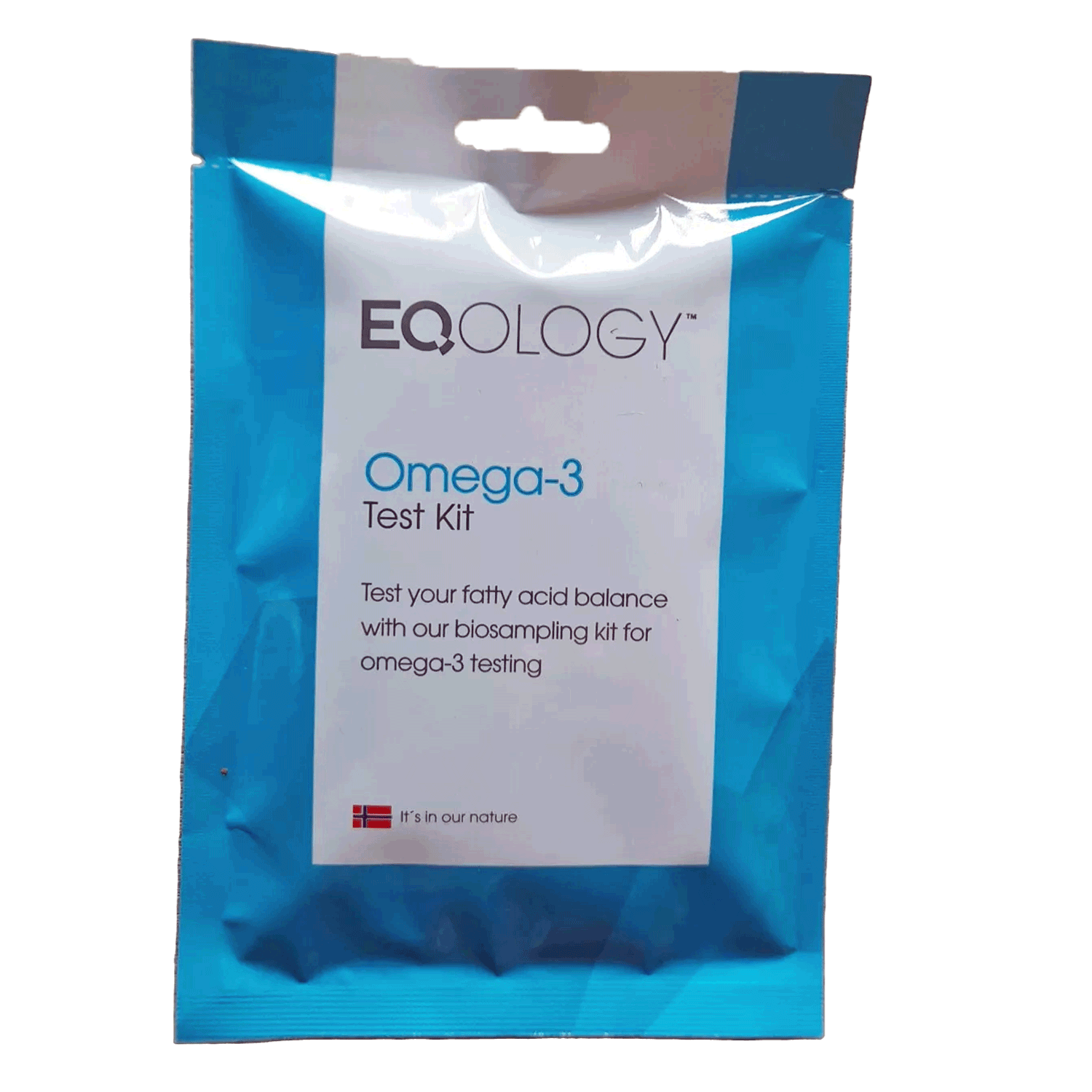- 338 mg DHA and 112 mg EPA per vegan softgel capsule
- Based on algae from controlled cultivation
- Suitable for vegetarians and vegans
| Quantity | Unit price | Base price |
|---|---|---|
| To 1 |
€39.90*
|
€453.41* / 1 Kilogramm |
| To 4 |
€38.00*
|
€431.82* / 1 Kilogramm |
| From 5 |
€36.00*
|
€409.09* / 1 Kilogramm |
Available in 3 days, delivery time 1-3 days
Algae oil with docosahexaenoic acid (DHA) and eicosapentaenoic acid (EPA)
DHA is more important than EPA for special groups of people (e.g. pregnant women, women who are breastfeeding and people over 50). For people who want to avoid fish oil (such as vegetarians and vegans or people with a fish allergy), algae oil is an excellent option to enrich their diet with additional DHA and EPA. The special thing about the algae oil in Vegan DHA/EPA 450 mg is its EPA content in addition to DHA. The DHA and EPA doses in softgel capsules of a vegan omega-3 supplement are also exceptionally high. The omega-3 fatty acids contained in this product are easily absorbed as they are in their natural, unprocessed triglyceride form. It goes without saying that only very fresh and pure algae oil is used for Vegan DHA/EPA 450 mg.
DHA and EPA of plant origin for the heart, brain and eyes
Together, the omega-3 fatty acids EPA and DHA have a beneficial effect on the heart. DHA also supports the maintenance of normal vision and healthy brain function. It is not without reason that the consumption of particularly fatty fish species, which are naturally high in EPA and DHA, has always been included in official dietary recommendations for a healthy diet. In 2010, the EFSA issued an additional recommendation for pregnant and breastfeeding women to increase their daily intake of DHA and EPA to 450 mg (of which at least 200 mg DHA). DHA also contributes to normal brain and eye development in breastfeeding infants and foetuses.
In practice, however, a significant proportion of people (including pregnant women, vegetarians and vegans) do not consume enough or any (oily) fish to reach the recommended daily intake of DHA and EPA. There are various reasons why these people do not reach the recommended daily intake. This can be problematic as fish is still our main source of EPA and DHA. The same official recommendations also indicate that it is better not to eat fish too often. This is because of the contaminants that fish can contain due to pollution (particularly dioxins, polychlorinated biphenyls (PCBs) and heavy metals such as methylmercury).
However, this is not a problem with high-quality, purified fish oil preparations, which contain only small amounts of these contaminants or none at all. The algae for an algae oil supplement are cultivated under segregated and carefully controlled conditions, eliminating environmental contamination. To maximise the health benefits of these unsaturated long-chain fatty acids, more and more people are choosing to supplement their daily diet with fish oil or algae oil supplements.
For people whose diet is vegetarian or vegan, DHA and EPA intake is particularly essential. After all, this group does not consume fish at all, which, as already mentioned, is still the most important food source of DHA and EPA. Some vegetarians or vegans use a vegetable oil as a dietary supplement. For example, flaxseed oil, which has a high concentration of the essential omega-3 fatty acid alpha-linolenic acid (ALA). To maintain the balance between omega-3 and omega-6 fatty acids, an ALA supplement is definitely advisable. The omega-6 fatty acid intake ratio is too high in Western countries, especially among vegetarians and vegans. However, it is a misconception to believe that ALA can completely replace the intake of DHA and EPA. The body can theoretically synthesise these omega-3 fatty acids from ALA, but the conversion is practically very complex. An algae oil preparation with DHA and EPA is therefore a recommended option for vegetarians and vegans. But also for people who are allergic to fish or for those who do not want to use fish oil for other reasons. Although algae oil is a sustainable source of DHA and EPA, its relatively high price makes it difficult to take higher doses of DHA (and also EPA).
Necessary EPA/DHA dose for an ideal omega-3 fatty acid balance
The omega-3 fatty acid balance refers to the amounts of EPA and DHA present in the body. It is now possible to determine the omega-3 fatty acid balance. One possibility is a blood test using a finger prick, which measures the so-called omega-3 index. The omega-3 index, a reliable indicator of omega-3 fatty acid status, indicates the proportion of EPA and DHA in the total fatty acid composition of the cell membranes of the erythrocytes. The content of long-chain omega-3 fatty acids in tissues and organs, including the heart, also correlates well with this omega-3 index.
There is growing evidence that an omega-3 index of at least 8% is optimal. Studies have shown that many people, especially those with a typical European diet (usually associated with excessive consumption of omega-6 fatty acids), require high doses of EPA/DHA to achieve an optimal index. With a low omega-3 index (around 4.5%, which is average in Western countries), supplementation of 2 grams of EPA/DHA usually results in the omega-3 index rising to around 8% after about three months. To maintain this index, around 700-1000 mg EPA/DHA per day is probably sufficient, although this depends on dietary habits. For those who do not wish to use fish oil supplements, Vegan DHA/EPA 450 mg can be used to increase the omega-3 index.
Authorised health claims:
- DHA is good for maintaining healthy brain function and good vision with a daily intake of 250 mg DHA.
- DHA is an important building block for the brain with a daily intake of 250 mg DHA.
- DHA plays a role in the function of the retina with a daily intake of 250 mg DHA.
- DHA contributes to the normal development of the eyes and brain of foetuses and breastfed infants - with a daily intake of 200 mg by the mother, in addition to the recommended daily dose of 250 mg EPA and DHA.
- EPA and DHA contribute to normal heart function with a daily intake of 250 mg EPA and DHA.
Valuable ingredients
| Valuable substances* | per daily portion of 1 capsule |
| Algae oil (natural triglycerides) | 1075 mg |
| - of which EPA (eicosapentaenoic acid) | 112 mg |
| - of which DHA (docosahexaenoic acid) | 338 mg |
* No reference quantity according to LMIV specified
Ingredients
Algae oil (DHA- and EPA-rich oil from the microalgae Schizochytrium sp.), humectant (glycerol), modified pea starch (softgel capsule), stabiliser (carrageenan), antioxidant (extracts containing strong tocopherols, rosemary extract).
Recommended intake
Take 1 softgel capsule per day with water with a fat-containing meal.
Storage instructions
Store in a cool, dry place away from light (not in the refrigerator).
Legal information
Do not exceed the recommended daily intake. Food supplements are no substitute for a balanced and varied diet and a healthy lifestyle. Store out of the reach of small children.
| Administration: | In vegan capsules. |
|---|---|
| Application: | Eyes , Brain , Heart & Vessels |
| Product Type: | Dietary supplements |
| Bezeichnung des Lebensmittels: | Nahrungsergänzungsmittel mit Fischöl |
Vitals, unsere neue Marke ab 2025
Wir sind ständig auf der Suche nach Marken, die unsere Ideale repräsentieren: Höchste Qualität, konsequentes Weglassen überflüssiger Zusatzstoffe wie Titandioxid oder Schweinegelatine, sehr gute Preis-Leistungs-Verhältnis und absolute Zuverlässigkeit bei der Lieferung an uns und damit auch an die Kunden.
Das ist sehr schwer, weil solche Firmen enorm selten sind, unter der Masse an Herstellern von Nahrungsergänzungsmitteln, die inzwischen auf dem Markt sind. Aber wir haben es wieder geschafft, fündig zu werden, mit Vitals aus den Niederlanden!
Anschrift des Herstellers: Vitals Voedingssupplementen BV, Pieter Lieftinckweg 29, 1505 HX Zaandam, Niederlande. E-Mail: kundendienst@vitals.eu.

Login

